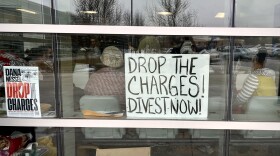-
Force Detroit celebrated its 10th anniversary with a gala highlighting its community-led work to interrupt cycles of violence and support young people, and a new fellowship honoring founder Alia Harvey-Quinn.
-
The information contradicts the Trump administration's narrative that it is targeting the "worst of the worst" when conducting immigration enforcement. and seems to violate a 2022 federal consent decree that puts strong conditions on warrantless arrests.
-
Tuesday’s ruling means transgender or nonbinary people who are without a passport or need to apply for a new one can request a male, female or “X” identification marker rather than being limited to the marker that matches the gender assigned at birth.
-
Across the state of Michigan, large crowds of protesters gathered to rally against President Donald Trump's administration. From Detroit, to Brighton, to Lansing, and beyond, those protesting named several issues — like immigration enforcement raids, cuts to federal programs, and fears of political violence as top concerns.
-
Organizers are accusing the president of putting on the parade as a show of dominance. The protests were peaceful, but came against the backdrop of assassinations in Minnesota.
-
Carlos Menjivar already had plans to leave the U.S. with his family this Saturday, advocates say. Now those plans are on hold while he's in immigration detention.
-
Student activists at the University of Michigan say they’ve been followed, recorded, and intimidated by undercover investigators hired by the university.
-
Report: Hate groups decline slightly in number in MI and nationally, but rise in political influenceThe Southern Poverty Law Center's annual report on hate crimes says nationally, the number of hate groups declined by about 5%, but the ideologies espoused by hate groups became increasingly mainstreamed in local and state politics.
-
Kent County Prosecutor Chris Becker made the announcement Thursday morning. "I did the best I could," he said, noting how it's split the community. "I don't see us being able to reach a verdict."
-
Attorney General Dana Nessel's office dropped trespassing charges against students charged with trespassing during a May 2024 raid on an encampment on U of M's campus.
-
Marking 77 years since the Nakba, University of Michigan–Dearborn protesters called on the school to divest from companies tied to Israel amid growing concerns over the humanitarian crisis in Gaza.
-
Christopher Schurr killed Patrick Lyoya during a struggle that began as a traffic stop in April 2022. The jury deliberated for days.














